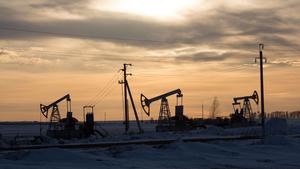 Oil pumping jacks, also known as "nodding donkeys", operate in an oilfield near Almetyevsk, Tatarstan, Russia, March 11, 2020. (ANDREY RUDAKOV / BLOOMBERG)
Oil pumping jacks, also known as "nodding donkeys", operate in an oilfield near Almetyevsk, Tatarstan, Russia, March 11, 2020. (ANDREY RUDAKOV / BLOOMBERG)
SINGAPORE - Global oil supply is set to tighten, intensifying concerns over soaring inflation after the OPEC+ group of nations announced its largest supply cut since 2020.
Global crude futures , jumped this week, returning to three-week highs, after the Organization of the Petroleum Exporting Countries and their allies on Wednesday agreed to slash output by 2 million barrels per day just ahead of peak winter season.
Saudi Energy Minister Abdulaziz bin Salman said the real supply cut would be about 1 million to 1.1 million bpd, a response to rising global interest rates and a weakening world economy
This is likely to drive spot prices higher, particularly for Middle East oil, which meets about two-third of Asia's demand, industry participants said, adding to inflation concerns as governments from Japan to India fight rising costs of living while Europe is expected to burn more oil to replace Russian gas this winter.
"We are concerned about a resurgence in international oil prices, which have shown some signs of calming down since the second quarter," a spokesperson at SK Energy, South Korea's largest refiner, told Reuters.
ALSO READ: OPEC+ agrees deep cuts to oil production despite US pressure
Another South Korean refining source said the supply cut could drive prices back to levels seen in the second quarter.
South Korea, Asia's fourth-largest economy and a manufacturing powerhouse, has seen costs skyrocket due to the surging commodity prices.
Brent hit US$139.13 a barrel in March, the highest since 2008, after the Ukraine conflict sparked fears of Russian oil supply loss.
Actual cuts
Saudi Energy Minister Abdulaziz bin Salman said the real supply cut would be about 1 million to 1.1 million bpd, a response to rising global interest rates and a weakening world economy.
That move triggered a sharp response from Washington, which criticized the OPEC+ deal as shortsighted. The White House said President Joe Biden would continue to assess whether to release further strategic oil stocks to lower prices.
"Saudi, UAE (the United Arab Emirates) and Kuwait are likely to take up most of the burden of cuts," said Tilak Doshi, managing director of Doshi Consulting, who was previously with Saudi Aramco.
While the SK Energy spokesperson expects US reserves release to accelerate ahead of the US midterm elections in November, RBC Capital analysts said follow-on sales would likely be more incremental.
"We are unlikely to see another blockbuster release in the near term," the bank added.
ALSO READ: Oil rebounds as OPEC+ weighs biggest output cut since 2020
The OPEC+ cuts compound supply concerns as European Union sanctions on Russian crude and oil products take effect in December and February, respectively, prompting Morgan Stanley to raise oil price forecasts. read more
"We hope OPEC+ will play a central role in balancing supply and demand in the run-up to the winter demand season," said Shunichi Kito, president of the Petroleum Association of Japan (PAJ).
The move by OPEC+ prompted warnings from oil importing emerging markets, some of which have become particularly vulnerable to price shocks amid recent global supply snags.
Sri Lanka is battling its worst economic crisis since independence in 1948, with a plunge in its currency, runaway inflation and an acute dollar shortage to pay for essential imports of food, fuel and medicine.
READ MORE: US move to rein in OPEC fuels worries
President Ranil Wickremesinghe warned Sri Lanka will have to pay even more for fuel as richer countries stock up for their own needs.
"This is not just an issue faced by us but several other South Asian countries," he told parliament on Thursday. "Global inflation is going to hit us all next year."


